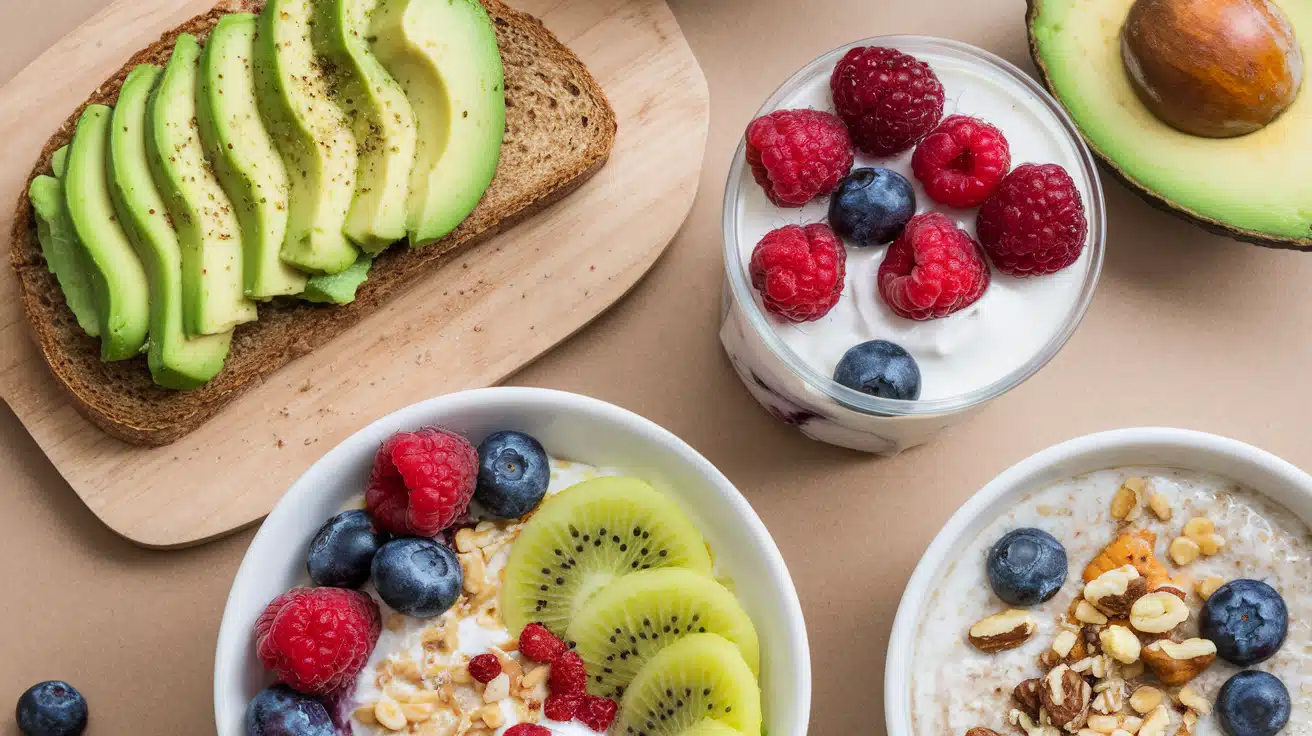You grab that golden, buttery croissant from the bakery shelf, but then pause. Is this treat ruining your health goals?
Most people think croissants are just empty calories wrapped in butter. But the real story is more complex than you might expect.
What if you could enjoy croissants without the guilt? What if you knew exactly how they affect your body and how to make them work in a healthy diet?
Let’s break down the facts about croissant nutrition, health risks, and smart ways to enjoy them without compromising your wellness plan.
What Exactly Is a Croissant?
A croissant is a crescent-shaped pastry originating from France, made from dough layered with generous amounts of butter, yeast, and flour.
The magic happens when it’s rolled and folded over and over, creating that airy, flaky texture we love. But all that butter comes with a cost; calories and fat add up fast.
Whether plain, stuffed with chocolate, or topped with almonds, croissants are a breakfast staple worldwide. So, let’s dig into what’s really inside one.
Nutritional Breakdown: What’s in Your Croissant?
Let’s talk numbers. A medium plain croissant (about 57 grams) packs a punch. Here’s the scoop, based on reliable nutrition data:
|
Nutrient |
Amount (Medium, 57g) |
Amount (Large, 67g) |
Why It Matters |
|---|---|---|---|
|
Calories |
~231 |
~272 |
A decent chunk of your daily calories; like a small meal. |
|
Total Fat |
12g (7g saturated) |
14g (7.8g saturated) |
Butter increases saturated fat, which can clog arteries if consumed excessively. |
|
Carbs |
26g |
31g |
Quick energy, but refined flour means a blood sugar spike. |
|
Fiber |
1.5g |
1.7g |
Barely any to keep you full or aid digestion. |
|
Protein |
5g |
5.5g |
A little for muscle repair, but not enough to rely on. |
|
Sugars |
~5g |
~7.5g |
Naturally occurring or added, especially in filled ones. |
|
Sodium |
~219mg |
~313mg |
It can creep up, especially in fast-food versions. |
You also get some micronutrients:
-
Selenium: About 24% of your daily needs, great for immunity.
-
B vitamins, including thiamine (18%), folate (13%), and others, help convert food into energy.
-
Vitamin A: Around 13% for healthy eyes and skin.
-
Iron and manganese: Small amounts for blood health and metabolism.
Filled croissants, such as those with chocolate or ham and cheese, can add 50-100 more calories and extra sugar or sodium.
Fast-food croissant sandwiches? Think 400-500 calories and up to 900mg sodium.
Compared to a bagel (about 250 calories, more fiber) or a muffin (often 300+ calories), croissants aren’t the worst, but they’re not winning any health awards either.
The Health Benefits of Croissants: Any Good News?

Croissants aren’t kale, but they’ve got a few things going for them. Here’s why they’re not total villains:
-
Instant energy: The carbs and fats are like rocket fuel for your morning. If you’re hitting the gym or chasing kids, that quick boost can be handy.
-
Micronutrient perks: Those B vitamins keep your metabolism humming, while selenium fights off germs. A little iron and vitamin A chip in for blood and skin health.
-
Mood lifter: Let’s be honest biting into a warm croissant feels like a mini-vacation. Enjoying treats now and then can keep you sane and happy.
-
Better versions exist: A 2024 study found that croissants made with sourdough or added fiber (such as oat or barley) may not spike blood sugar as much as regular ones. That’s a win for your body.
Sure, these benefits are modest, but they mean croissants aren’t just empty calories. They can fit into your life if you play it smart.
The Health Risks: Why Croissants Can Be Trouble
Now for the less fun part. Croissants have some downsides you can’t ignore:
-
Saturated fat overload: That buttery flavor comes from approximately 7 grams of saturated fat per croissant, which accounts for up to 39% of your daily limit. Too much saturated fat can raise “bad” (LDL) cholesterol, upping your risk for heart disease. A 2024 Oxford study found that consuming croissants daily for just 24 days increased liver fat by 20% and cholesterol by 10%, even without weight gain. Scary stuff!
-
Blood sugar spikes: The refined white flour causes your blood sugar to rise rapidly, then crash. This can leave you tired, hungry, or cranky, bad news for diabetes management or stable energy.
-
Not filling: With only 1.5 grams of fiber, croissants don’t stick with you. You might be raiding the fridge an hour later.
-
Sodium sneak attack: Store-bought or fast-food croissants can pack 300-900mg of sodium, which isn’t great for your blood pressure.
-
Refined grains risks: A 2021 study linked eating lots of refined grains (like croissant dough) to higher chances of heart disease and stroke over time.
Daily croissants? Not a great plan. They’re more of a “sometimes” food.
How to Enjoy Croissants the Healthy Way
You don’t have to ditch croissants entirely. Here’s how to enjoy them without feeling like you’re betraying your health:
-
Keep it small: Grab a mini croissant (around 100-150 calories) or split a big one with someone. You get the taste without the calorie bomb.
-
Pair with power foods: Add protein like a boiled egg, Greek yogurt, or almond butter to keep you full. Toss in some strawberries or a side salad for fiber and vitamins.
-
Choose smarter versions: If you can, go for whole-grain or sourdough croissants; they’re harder to find but better for you. Or try baking your own with less butter or healthier fats like olive oil.
-
Save for special days: Limit croissants to once or twice a week. Studies show daily indulgence can mess with your cholesterol and liver, even if you don’t gain weight.
-
Skip the extras: Avoid piling on sugary jams, whipped cream, or more butter. A little fruit spread or avocado is way kinder to your body.
If you’ve got health issues like high cholesterol or diabetes, check with a doctor or dietitian to see how croissants fit into your plan.
Healthier Alternatives to Satisfy Your Croissant Craving
Sometimes you want that flaky vibe without the guilt. Here are some swaps to try:
-
Whole-wheat toast: About 80-130 calories and 3-4g fiber, plus it’s versatile. Add avocado, a poached egg, or peanut butter for a nutrient-packed breakfast.
-
Greek yogurt parfait: Layer yogurt with fruit and granola for protein, fiber, and crunch—around 200 calories and way more filling.
-
Oatmeal with toppings: Oats have 4-5g fiber per serving and keep you full for hours. Sprinkle on berries or nuts for flavor.
-
DIY “healthy croissants: Look up recipes using Greek yogurt, almond flour, or whole-wheat flour. They mimic the texture with less fat and more nutrients.
For comparison, a whole-wheat English muffin has about 130 calories, 4g fiber, and 4g protein—way more balanced than a croissant’s 230 calories and 1.5g fiber.
Croissants vs. Other Pastries: How Do They Stack Up?
Wondering how croissants compare to donuts, muffins, or bagels? Here’s a quick look:
-
Donuts: Similar calories (200-300), but often more sugar and trans fats. Croissants might edge out slightly due to micronutrients.
-
Muffins: Can hit 300-500 calories, especially at coffee shops, with more sugar but similar fat. Not much better.
-
Bagels: Around 250 calories, with more fiber (2-3g) and less fat (1-2g). A better pick if you go easy on cream cheese. Croissants aren’t the worst offender, but they’re not your healthiest breakfast buddy either.
Making Croissants Work in Your Diet
If you love croissants, you don’t need to feel bad about them. The key is balance. Think of them as a treat, not a daily must-have.
Pair them with nutrient-dense foods to round out your meal. For example, a small croissant with a scrambled egg, spinach, and a handful of berries can be a solid breakfast.
If you’re watching your weight, calories, or health conditions, keep croissants as an occasional splurge—maybe a weekend ritual.
For special diets:
-
Low-carb or keto: Look for almond-flour croissant recipes online.
-
Gluten-free: Some bakeries offer gluten-free versions, but check the nutrition—they’re not always lighter.
-
Vegan: Swap butter for plant-based margarine in homemade recipes, but watch for added sugars.
Conclusion
So, are croissants healthy?
These buttery pastries pack calories, saturated fat, and refined carbs that can harm your health if eaten daily. But they also provide quick energy and some nutrients your body needs.
The key is balance. Enjoy a small croissant once or twice a week, not every morning. Pair it with protein-rich foods like eggs or Greek yogurt. Choose whole-grain versions when possible. Listen to your body and respect any health conditions you have.
Food is meant to bring joy, not stress. A croissant shared with friends or savored on a lazy Sunday can feed your soul too. Just make it the exception, not the rule.
Ready to make better breakfast choices? Check out our guide to healthy morning meals that keep you satisfied all day.









